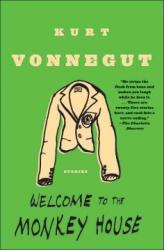
Much like short story anthologies by a single author (see Neil Gaiman’s Smoke and Mirrors and Ray Bradbury’s The Golden Apples of the Sun ), Welcome to the Monkey House is both quintessentially a collection of Kurt Vonnegut’s biting wit and satire as well as an exploration of other genres not often associated with Vonnegut’s style. Fans of Vonnegut will likely have already read some of these short stories (like “EPICAC” and “Tomorrow and Tomorrow and Tomorrow”), but some of the other stories might have been missed and for a good reason.
Overall, Welcome to the Monkey House is a fantastic set of stories, but a few of them fail to have the impact to make them memorable. Granted, these stories are few and far between, and help to break up the well-written social commentaries presented in “Harrison Bergeron” and the titular “Welcome to the Monkey House.” Vonnegut’s ability to show the slippery slope of such ideas as “everyone is equal” and “sex is bad,” respectively, is just as poignant in short form as it is in his novels. The fusion of technology in these stories might seem dated by today’s standards, but they do reveal that Vonnegut was, inherently, a science-fiction writer.
What this collection does well is show that Vonnegut understood the importance of the characters in a story. One of the most entertaining in this collection was “Who Am I This Time?” which contained characters at such extremes of human expression as to be completely unrealistic but somehow relatable and entertaining. Stories like this, which don’t necessarily follow the political or societal commentary that the other stories provide, are nice breathers that give the reader a smile instead of drilling thought-provoking ideas into their skulls. It’s this balance that truly makes Welcome to the Monkey House a must-read.
Vonnegut, true to form as well as outside his element, I give Welcome to the Monkey House 4.0 stars out of 5.
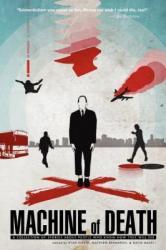
The concept is simple: a machine takes your blood and spits out a card with the means of your demise printed on it. In this collection of short stories, a variety of authors explore what this truly means for individuals, as well as society as a whole. Based off an idea by Ryan North (author of “Dinosaur Comics”), this anthology has plenty of different approaches to the concept that a machine could predict how a person will die. However, many of these ideas hit upon the same concepts and social implications, making the whole thought exercise seem redundant by the end of the book.
Part of me felt the idea itself was a little derivative of Death Note, but with a more ambiguous set of constraints. Each of the short stories included in this anthology had some unique twist on the idea, ranging from humor to romance to horror. Still, every author tended to agree: a machine of death would bring about a dystopian future in some form or other. From governments requiring a “death reading” to mitigate any national disasters to a school needing to know how their prospective students will die so they can save face, the real enemies of this idea tended to be the bureaucracies of humanity.
While I honestly enjoyed the stories included in this anthology, they all seemed to suffer from the “a priori problem.” With each story titled with some way to die, you half-expect the story’s main character to end via that method. The intrigue is more in the how and when; thus providing interest to the story despite practically knowing the ending before it even starts. Granted, that’s part of the appeal of the machine: the ambiguity is as freeing as it is constraining.
A morbid set of interesting short stories, I give Machine of Death 4.0 stars out of 5.
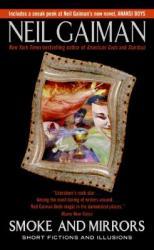
As someone who has to read many short story submissions for the anthology my writing group puts together each year, I can appreciate a well-written short story. I have not read much of Neil Gaiman, but in his collection of anthology short stories, Smoke and Mirrors, I was able to see what kinds of stories a professional writer writes for an anthology. While quite a few stories were interesting, not all of them were necessarily in genres I typically read. Then again, I consider erotica and stories submitted to Hustler as pornography, which is why I do not read these kinds of short stories.
Furthermore, it is a little more uncomfortable listening to erotica, as was the case with this audiobook. Fortunately, Gilbert Gottfried did not read it, but it still is uncomfortable to hear it nonetheless. Sure, the concepts in these short stories were somewhat interesting, but the sex ruined it for me. At least there were enough other stories that I found fascinating to make it worth my while to get all the way through it. The simplicity and genius of these ideas merely verify Gaiman’s writing talent, even if a few were hard to follow. At least a few of them followed the title of the book, which helped tie these separate stories together.
Perhaps my biggest qualm with this book was its structure. Moreover, maybe it was a limitation of a direct transferal to the audiobook format, but it is almost impossible to go back to the first section of the book and listen to the intro for each story before reading that story. Instead, it dispensed pertinent information on every short story before I even had a chance to get to them. If I were to appreciate each story fully, it would have been better to introduce each one with background information, so the context is fresh in the listener’s memory.
A collection of well-written short stories, I give Smoke and Mirrors 3.5 stars out of 5.
For more reviews of books and movies like this, please visit www.benjamin-m-weilert.com
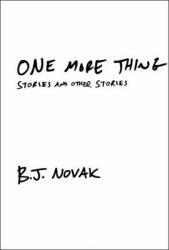
Ever wonder what your grandmother might be up to in heaven? Or maybe why it is that there are some people who just give the best advice? BJ Novak, writer and star of The Office, explores these topics and much more in his refreshingly hilarious One More Thing: Stories and Other Stories. Tales run the gamut of the absurd to the seemingly mundane: from a peek inside a blind date with a warlord, to a boy who is not allowed to eat sugary name-brand cereals. Each story is almost like two sides of the same coin, all at once being achingly funny and heartbreakingly human. The collection, while as a whole is mostly always humorous, ebbs and flows with a sincerity that demonstrates Novak’s keen ability to not only write about human emotion, but to make the reader feel it as well. One More Thing shows that Novak’s writing is intelligent, his command of language sharp and his wry humor at its best.
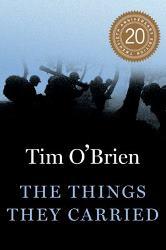
Actual Rating: 3.9
This book is good and fairly understandable if you like books that take place in war times. It has A LOT of symbolism which many can be examples of the exact things they carried. There are many back stories and stories about the soldiers as well giving you a lot of imagery as to what is happening. It talks about their missions and thoughts emotionally. It was a little difficult for me to read it but it's a pretty well written book otherwise.
Reviewer Grade: 12



 Ruth Holley Library will be temporarily closed for approximately one week starting Mon., Dec. 2 to complete roof repairs.
Ruth Holley Library will be temporarily closed for approximately one week starting Mon., Dec. 2 to complete roof repairs.